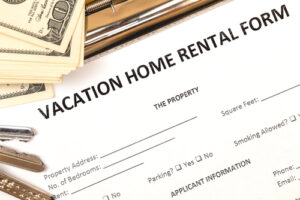How to Finance a Vacation Rental Property With a Hard Money Loan
Vacation rentals are an excellent way for investors to explore a new strategy and earn returns quickly. There are several ways to finance a vacation rental property, whether you want to use a regular mortgage loan or a hard money loan. Today, we’ll discuss using a hard money loan to finance your investment. So, read along to learn more about vacation rentals and hard money loans.

Contents of This Article:
- Why Invest in Vacation Rentals?
- Pros and Cons of Vacation Rental Properties
- How to Finance a Vacation Rental Property With Hard Money
- Tips for Finding a Good Vacation Rental
- Find a Hard Money Lender That Aligns With Your Goals
Why Invest in Vacation Rentals?
Vacation rentals are a great investment choice for several reasons. For one, more people want to stay in short-term rental homes like Airbnbs, rather than hotel rooms, while on vacation. So, the demand is high in most tourist destinations. In addition, vacation rentals give tourists and travelers a more at-home experience and may allow them to be closer to local attractions they want to visit.

Additionally, vacation rentals generally have low barriers to entry and significant tax benefits. After all, your vacation home is considered a real estate business if it’s rented out for at least two weeks out of the year. So, although your income is taxed, you can write off several expenses.
If you’re looking to invest in a vacation rental property, you’ll want to learn how to finance it. With several types of real estate loans in Maryland, you’ll want to weigh the pros and cons. Today, we’ll discuss how to finance a vacation rental property with a hard money loan. But first, we’ll discuss the pros and cons of short-term vacation rentals.
Pros and Cons of Vacation Rental Properties
Adding vacation rentals to your portfolio is a large decision that needs thorough research. That said, like any investment method, there are some pros and cons to vacation rentals. For instance, while you have additional income and tax benefits, you also have more expenses and local restrictions to worry about. Read along as we review the main pros and cons of vacation rental properties.
Benefits of Investing in Vacation Rentals
- Tax Benefits- Although you’ll pay more income tax, you’ll also receive several tax benefits. For instance, you can deduct interest, property taxes, and management fees. Additionally, you can write off other business costs like supplies and housekeeping expenses.
- Additional Income- One of the most apparent benefits of vacation rentals is the extra income. Many vacation rentals can bring in cash-on-cash returns of nearly 10% each year. As such, the earning potential can be highly lucrative.
- Built-In Vacation- Buying a vacation rental means using it whenever you want. So, buying a vacation home in a popular destination can also give you a place to stay during your vacation.
- Long-Term Value- Most real estate appreciates, especially in high-demand areas. As such, the vacation home that you buy can grow in value, giving you a better resale value.
Disadvantages of Vacation Rental Properties
- Local Restrictions- Some HOAs and jurisdictions have strict restrictions on vacation rentals. As such, you’ll want to review local laws and learn about any restrictions on short-term rentals before buying one.
- Expenses- Rental property expenses can add up quickly, especially for vacation rentals. After all, vacation rentals should generally be fully furnished, cleaned, and stocked with basic supplies for each guest.
- Potential Vacancies- Marketing for vacation rentals is one of the most important aspects of owning them. Without good vacation rental marketing, you could face long vacancy periods, earning no income during that time.
- More Wear and Tear- Investing in vacation rentals require maintenance and upkeep. More people coming in and out of your short-term rental creates more wear and tear and higher maintenance costs than other rental investments.
How to Finance a Vacation Rental Property With Hard Money
While there are several ways to finance a vacation rental property, a hard money loan can simplify the process. After all, using a hard money loan can help you secure your investment faster with fewer requirements and faster funding.
Your real estate secures your hard money loan, so you don’t need to have excellent credit to qualify. That way, you don’t have to go through the dreaded, long process of working with a bank or traditional lender. Instead, most hard money lenders are individuals or specialized companies.

So, to get a hard money loan for your vacation rental, there are a few crucial steps to take. For one, you need to talk with a lender and apply for a loan to see if your property qualifies for a hard money loan. Then, you’ll need to gather the right documentation. Generally, you need tax documents, bank statements, and thorough information about the property. Finally, once you’ve provided the proper documentation, you’ll need to get an inspection and valuation of the property.
After that’s taken care of, assuming there are no issues with the appraisal, inspection, or title, you can access your loan funds. It’s as simple as that! If you plan on keeping the property long-term, you’ll need to refinance to ensure your lender receives a complete payoff of your hard money loan.
That said, there are a few downsides to consider with hard money loans. For instance, they generally have higher interest rates, shorter repayment terms, and higher closing costs. However, the benefits generally outweigh the disadvantages for investors needing fast financing.
Tips for Finding a Good Vacation Rental
Investing in vacation rentals is an excellent choice for investors looking for a change or portfolio diversification. However, deciding to invest is just the first step. Next, a lot of research goes into finding the best property for your investment. Here are some of the top tips for finding successful short-term rentals.
Location

The most crucial aspect of any vacation rental is the location. That said, choosing the right location goes beyond just picking a city or destination. For instance, each city has different areas or neighborhoods to consider.
First, you’ll want to determine whether or not people are flocking to that area. Then, you’ll want to learn why people are going there–is it the weather, local attractions, etc.? Next, learn which locations offer the best proximity to large attractions and whether it’s a popular vacation destination. Finally, decide what property types make up most of the market, whether single-family, multifamily, or condos.
Demand
If you invest in vacation rentals, you need to ensure there’s demand for them. Researching the demand for a vacation rental includes looking at the tourist potential for the target area. Ultimately, you’ll want to find which locations offer the best demand for vacation rentals. After all, unlike traditional rental investments that house tenants for 12 months at a time or longer, short-term rentals need to attract first-time and repeat guests.

Seasonality
Vacation rentals depend highly on seasonality and different demand levels throughout the year. For instance, buying a vacation rental on the beach will attract more tenants during the summer. On the other hand, a short-term rental in a large city can attract tourists or business travelers all year round.
Occupancy
Finding the occupancy rates for vacation rentals is crucial for determining potential income. You can find the occupancy rate of a rental by dividing the number of nights the property is booked by the number of available nights. Several factors can affect the occupancy rate, such as the number of bedrooms, size of the home, amenities, and proximity to local attractions.
ROI
Some vacation rentals may have an annual ROI of 15% or more. After all, you can charge higher rates for vacation rentals and change the rental amount depending on the season, days of the week, etc. However, there are several expenses to consider, like maintenance, repairs, taxes, and insurance.
Find a Hard Money Lender That Aligns With Your Goals

If you’re looking to finance a vacation rental property with a hard money loan, the first step is finding a lender. It’s important to find a lender that aligns with your investment goals and sees your vision. Luckily, Maryland Hard Money Lenders can help you finance your next investment, whether you’re financing a vacation rental, fix-and-flip property, or multifamily real estate.
Financing with one of our expert hard money lenders is simple–you just need to provide the right documentation along with 10% of the purchase price and closing costs. Then, you can typically have financing for your property within 48 hours. So, if you want to learn more about our lending process and how it works, contact Maryland Hard Money Lenders today!



